Our 2021 in Photos
Photographers share thoughts about moments shared with patients, staff around the world
Posted on Dec 22, 2021
So much of the work goes unheralded, unseen.
In a newly modernized Rwandan hospital, a mother spoon-feeds her son, sharing a laugh to distract him from the pain of cancer treatments. A community health worker in Malawi takes a long daily walk to meet patients where they live, going village to village to make sure they have the medicines and support they need. And a girl in rural Chiapas visits her mountainside clinic, where a doctor connects her to cutting-edge health care that is saving her life.
These things happen every day. Mothers and children and medical workers and governments and activists for vaccine equality—they are all partners in health. And when Partners In Health photographers get close enough to that crucial work to make an evocative picture, it’s my job as photo editor to make sure it gets seen. By colleagues, by donors, by policymakers, by people who can make a difference in the lives of those on the other side of the camera. By you.
These are some of my favorite photos from 2021—images of solidarity, of partnership—and I asked the people who made them to share some thoughts about the moments they shared.
Thomas Patterson
—Partners In Health Photo Editor
Joy in Ordinary Moments
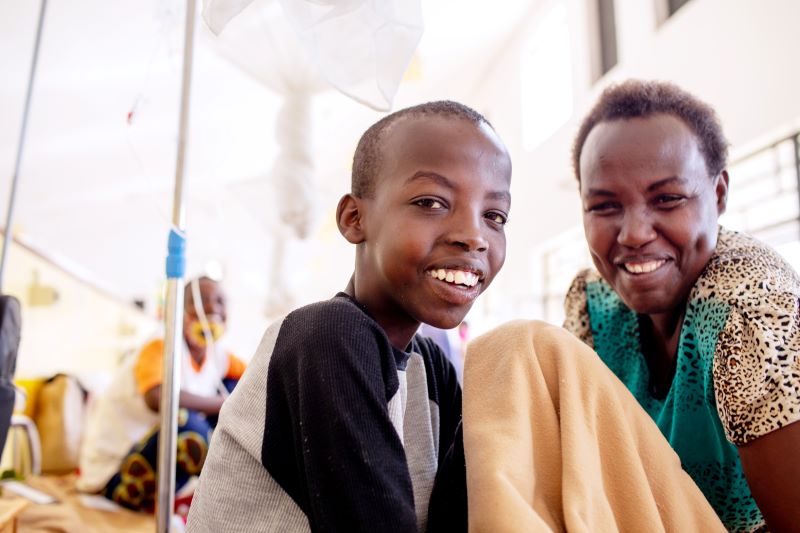
Zack's thoughts:
As a photographer, I don’t take lightly the fact that patients in PIH-supported facilities and communities share a glimpse of their lives during some of their most difficult periods and moments. Immaculée and her son Jean had shared their cancer care story for a video project. I was in the pediatric oncology ward and saw Immaculée feeding Jean some food from a spoon - something he had trouble accepting just days before without pain. I asked to make some photos of that since her love for him and his sense of safety and comfort seemed so apparent.
Sometimes it’s hard to make strong and honest photos in a busy and crowded hospital ward. There's nothing normal about having a camera in your personal space during such a private and seemingly ordinary moment. As a parent myself, I can begin to imagine that there's nothing normal about having a kid with cancer. Despite my efforts to be quiet and non-intrusive, they were unable to continue with the food in that moment, because they were looking at each other and fighting back what became contagious laughter.
It was a beautiful moment to witness. I don't think my presence created the laughter, but it may have tipped them over the edge.
It's a bit of a ridiculous thing to have a photographer, who you don't really know, making pictures of you doing an ordinary thing like eating. But the laughter was real and deep. Serious illness can be such an exhausting and overwhelming experience, but you just do what you have to do and it's your new normal. This is when things go well and quality care is actually accessible. It was a gift to witness and feel the togetherness between Jean and his mother, the love they clearly shared. No matter the circumstances, sometimes all you can do is laugh.
Jean was walking around the hospital campus later that day. Something that we hadn't seen him do in a while.
*Name changed for minor
'The Hospital's Baby'
Maya's thoughts:
“His adoptive mother, Kadija, who is a nurse at Koidu Government Hospital in the pediatric emergency ward, had one of her family members bring him in, and he got to the PIH office at the hospital and everyone as so, so excited that he was there. Everybody was taking turns holding him and wanted photos with him. It’s funny, he’s kind of like a celebrity around the hospital. I’ve heard him referred to as ‘the hospital’s baby.’ Obviously the circumstances under which he was born are tragic and point to how much work we still have to do to achieve better health in Kono, given that he himself almost didn’t survive, and he lost both of his parents in quick succession. But everyone rallied around this particular baby and made sure he survived, and they were successful because they finally had the necessary resources. I think people see Naphtal as a symbol of hope."
Teen Conquers Cancer
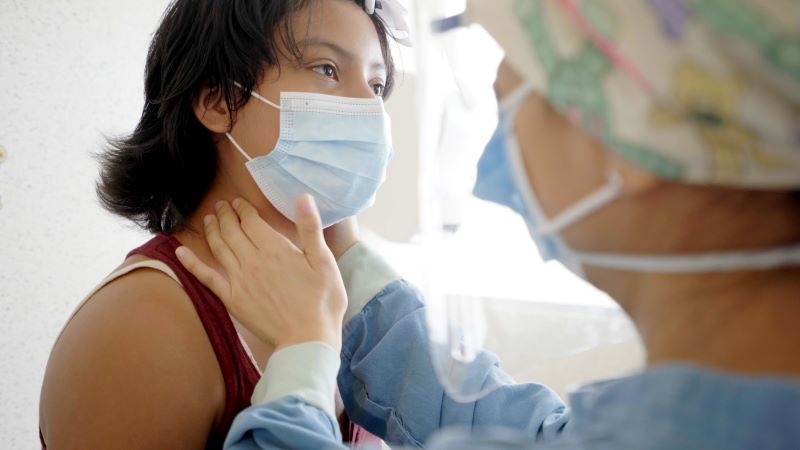
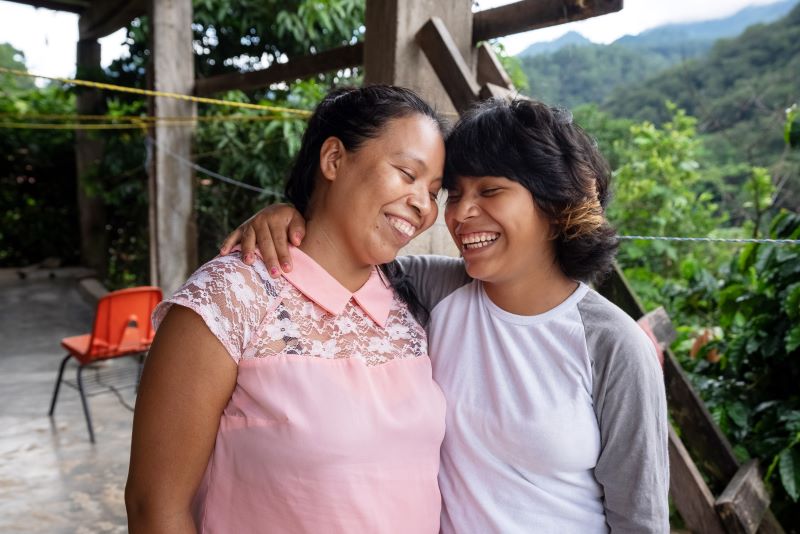
Masao's thoughts:
“[The day of] Ariadna’s hospital visit began very early. The sun hadn’t yet risen and she and her mother were traveling along the highway to arrive from very far away to hear the doctor’s opinion.
The moment Ariadna gets up onto the exam table and the doctor begins to access that there have been positive advances was a marvelous moment where the mother and daughter looked at each other with such happiness, knowing that all those hours, kilometers, pains, and tears were worth it. The doctor congratulated them, because Ariadna is in good health.
Leaving the hospital, Ariadna’s mother called their family to share with them the good news. It was a moment in which all of us could feel the incredible strength of an 11-year-old girl who had demonstrated courage in life.”
Heartbreak, Hope of Malnutrition Care
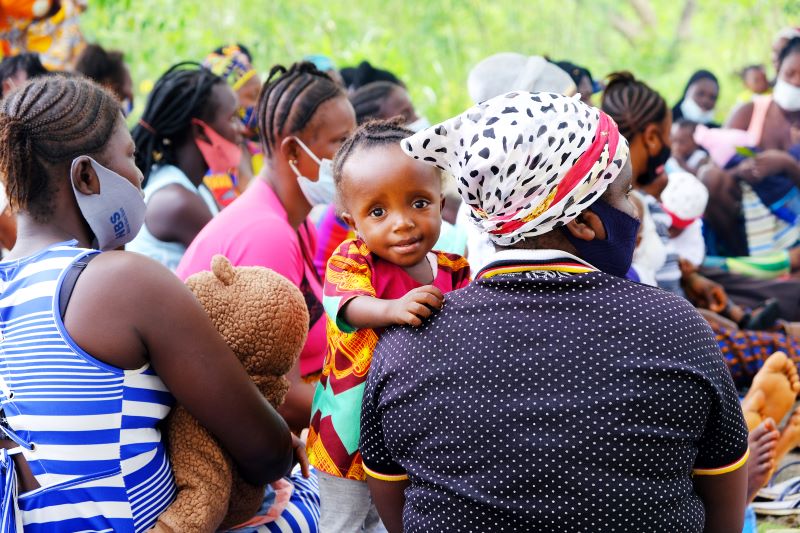
Maya's thoughts:
“The nurse in charge of the MAM feedings, Mariama Mansaray, was reflecting to me that mothers are often upset, as anyone would be, having their child malnourished, without reliable means to feed them. Everybody wants to feed their kid. So it’s a little heartbreaking in that context, but also uplifting, because help is available, for both malnourished children and mothers looking to feel less alone.”
Teaching with Empathy, Intention
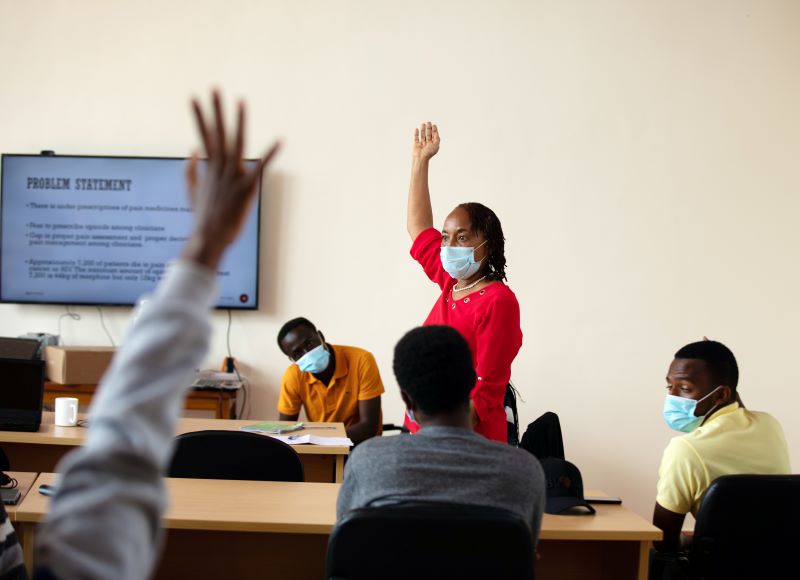
Zack's thoughts:
Dr. Akiiki, as she's most commonly addressed by her students and colleagues, is exactly the sort of mentor and teacher you'd want your nurse or doctor to study under. That's because patient-centered and community-centered care requires deep listening, deep empathy, and that extra mile or kilometer necessary to go from simply treating the disease to treating the patient.
This sort of empathy and care was evident watching Dr. Akiiki teach and during the little time I was able to spend with her in less formal settings. She brings the same intensity and intention to her listening as she does her lecture. She reminds me of some of my own most cherished mentors, whose commitment to the work (whatever that might be) was intoxicating. It also reminds me of the energy and commitment of so many PIHers I've gotten to bond with over the years. It's an energy and a mission that's much bigger than any teacher, or community health center, or photograph. I don't know if this photograph says these things, but I strive to make photos that share that energy—if only a small piece of it.
I particularly enjoyed photographing this class, in which the discussion was focused on palliative care. Too often the sickest and poorest patients miss the dignified and loving accompaniment needed throughout their ailments, whatever the outcome. That's unacceptable, and as Dr. Akiiki engaged with the students at Butaro District Hospital that day, I couldn't help but feel optimistic about the future of social and community medicine in rural Rwanda.
Sunrise and Small Moments
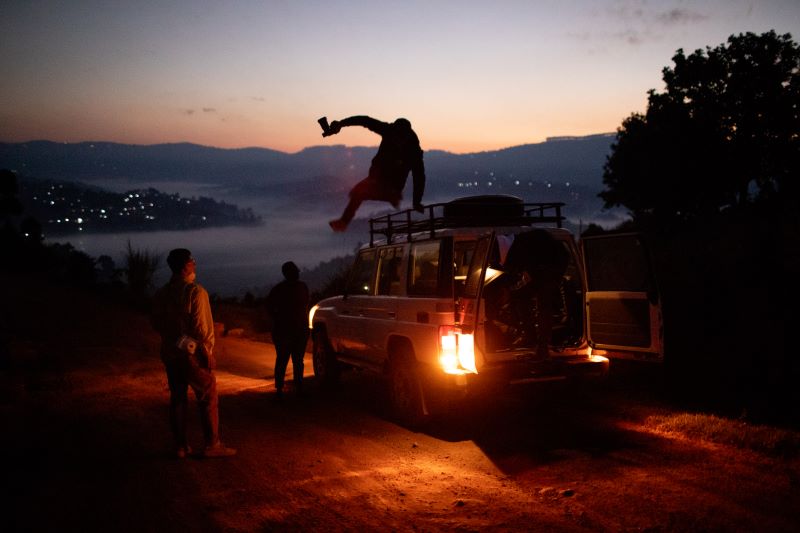
Team members pictured: Stella Mucyo, Pacifique Mugemana, John Ra, Tracy Keza, and Nina Peskanov. Photo by Zack DeClerck / PIH
Zack's thoughts:
The landscape of Rwanda's Burera District is absolutely stunning. From this hilltop in particular, a sunrise that lasts an hour seems to last much longer. We arrived this morning just before the first light began to reveal the foggy valleys and neighboring hilltops that housed the University of Global Health Equity to the right and Butaro District Hospital to the left. PIH in Rwanda's staff videographer, Pacifique Mugemana, had unloaded the roof of our vehicle, carefully passing video equipment down to us. Once the roof was unpacked, he very quickly jumped off like a movie stunt double, camera in hand. Luckily, my eye was in the viewfinder and my finger on the shutter button. Thanks, Paci!
From this rural road, you could really feel the world wake up.
Children began making their way to school through the footpaths and bean crops. The fog began to clear, revealing the many layers below. While the landscape is breathtaking, it's easy to see why transportation is such a barrier to accessible health care—among other needs, and why the ‘staff, stuff, space, systems, and social support’ need to be here, not just in Kigali or Boston, for that matter.
COVID-19 and Community Outreach
Scott's thoughts:
“The vaccine site had such a diverse group of people that really represented the dynamic of Immokalee. It was nice to see children helping their parents through the process and members of PIH greeting residents they know and spoke to about the vaccine process.”
Access, Equity in Vaccination
Maya's thoughts:
“With every new variant, it’s clear that we continue to be in this spiral around COVID-19. Why? It’s in large part because of unequal vaccine distribution, and because in many places in Sierra Leone and around the world, the health care systems that need to exist do not. And because, from an economic perspective, people have way less of an opportunity to protect themselves in settings of poverty.
So much of what is fueling this pandemic is injustice—injustices that are deeply entrenched, but in no way inevitable.”

